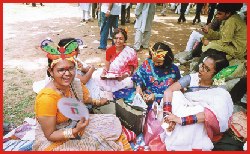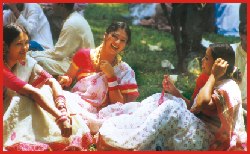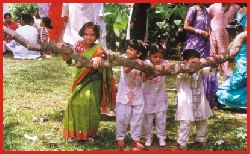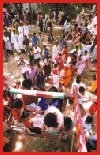
A
small girl was walking animatedly, with her hands tucked firmly inside
her father's and shouting with glee at the sight of almost everything.
It was an early April morning, the sun barely peeked over the eastern
horizon but the little girl already felt its rays burning down her
neckline. But that was not going to stop them.
The
walk from Ramna, passing through the university and joining
the merry makers on the street, and her first Boishakhi mela
on the grounds of Bangla Academy was not like anything she had experienced.
This was her first time, the colours, the sounds; the smells were
all too intoxicating for her.
 The
thrills and pleasures for this tot was plenty, riding the nagordola
over and over again till her head became giddy, picking on that fluorescent
pink cotton candy, was a treat of a lifetime. The joy multiplied by
the seconds for her as she discovered new delights at every step on
the fair ground. The terracotta pots and pans, those lovely painted
replicas of fruits and vegetables, those sugar treats in white and
saffron yellow, that first taste of street food, the aam bhorta
and that tinkling sound of her glass bangles-red yellow, blue, green.
The father obviously indulging his daughter to her heart's fills.
The experience was forever etched in her memory and till today come
Boishakh, her heart wells up with anticipation of joy and
sheer ecstasy.
The
thrills and pleasures for this tot was plenty, riding the nagordola
over and over again till her head became giddy, picking on that fluorescent
pink cotton candy, was a treat of a lifetime. The joy multiplied by
the seconds for her as she discovered new delights at every step on
the fair ground. The terracotta pots and pans, those lovely painted
replicas of fruits and vegetables, those sugar treats in white and
saffron yellow, that first taste of street food, the aam bhorta
and that tinkling sound of her glass bangles-red yellow, blue, green.
The father obviously indulging his daughter to her heart's fills.
The experience was forever etched in her memory and till today come
Boishakh, her heart wells up with anticipation of joy and
sheer ecstasy.
Well
that was my first mela experience and for that single moment
in my youth, I could live over and over again.
Many
things have changed since that day. For one thing, I grew up. I learnt
to be critical of simple pleasures of life, became scared of bombs
and of traffic jams, and above all my father is no longer there to
share this day with me anymore. The meaning of fun changed-forever.
 Then
the flavour of the mela itself changed, the mood and the
ambience, it all became pathetically commercialized, organized to
some extent. Then again many a times the mela didn't take
place at all, and the venue changed. The media attention to the Fine
Arts colourful rally, the eternal Ramna Botomul gathering
that welcomes the New Year, actually overshadowed the Boishakhi
mela to great extent.
Then
the flavour of the mela itself changed, the mood and the
ambience, it all became pathetically commercialized, organized to
some extent. Then again many a times the mela didn't take
place at all, and the venue changed. The media attention to the Fine
Arts colourful rally, the eternal Ramna Botomul gathering
that welcomes the New Year, actually overshadowed the Boishakhi
mela to great extent.
But
somehow I have always related melas with Boishakh
and so has my daughter; the only difference is that she looks forward
to the one her school arranges every year while I wait for the one
on the street.
I
can see the same craving for fun, the same anticipation in her when
she dresses in red and white shalwar kameez or sari and stuffs her
tiny purse with token money and walks right into the school premise
hand in hand with a friend. The same elated, happy face after riding
the nagordola, the same dizzy feeling, the same glass bangles,
the same toys; she is also a true Bangali learning to appreciate
her culture. No matter what medium she is studying in or what computer
games or cartoons or books are her favourites, she is aware of her
roots, her motherland and I am proud because of that.
 I
don't want her young impressionable mind to be muddled up with thoughts
like ‘this is not part of my culture or there is no difference
between religion and culture'. I believe culture is the calling
of the soil; it is describing your land, your colour, your mind to
others, while your religion is your faith, your conviction. Just for
the sake of it, think whether a Christian Bangladeshi is the same
as that of an American, doesn't he use his fingers when he sits to
enjoy his rice and fish curry, or does he use forks? A Muslim of Bangladesh
is not doing what Muslims of Malaysia or Turkey are doing; we wear
saris to work while they wear suits. Our faith is the same not our
culture.
I
don't want her young impressionable mind to be muddled up with thoughts
like ‘this is not part of my culture or there is no difference
between religion and culture'. I believe culture is the calling
of the soil; it is describing your land, your colour, your mind to
others, while your religion is your faith, your conviction. Just for
the sake of it, think whether a Christian Bangladeshi is the same
as that of an American, doesn't he use his fingers when he sits to
enjoy his rice and fish curry, or does he use forks? A Muslim of Bangladesh
is not doing what Muslims of Malaysia or Turkey are doing; we wear
saris to work while they wear suits. Our faith is the same not our
culture.
In
every country they have their own way of celebrating their new year,
of celebrating their carnivals and festivals. Pohela Boishakh
with all its vivacity and flavour has been part of our history for
hundreds of years. Interestingly it was the time of Muslim Mughal
king Akbar when celebration of the Bangla New Year began. And this
celebration had nothing to do with religion but with new rice plantation.
 To
my knowledge, on April 14 or 15, Sri Lanka, Vietnam and Cambodia and
some other rice-cultivating nations also celebrate the New Year.
To
my knowledge, on April 14 or 15, Sri Lanka, Vietnam and Cambodia and
some other rice-cultivating nations also celebrate the New Year.
I
will not disown this merrymaking and celebration for no good reason
at all. I will offer my Fajr prayers and hit the bandwagon
for I remain equally animated this Boishakh as I was way
back in time and so is my daughter, we know our faith and our culture
and we are true to both.
By
Raffat Binte Rashid
Photo: Star Archive

